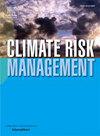通过(联合国)从跨学科研究项目中学习,利用气候适应能力
IF 5
2区 环境科学与生态学
Q1 ENVIRONMENTAL SCIENCES
引用次数: 0
摘要
欧洲的气候适应面临着重大的实施差距:虽然高层政策制定了雄心勃勃的恢复力目标,但由于根深蒂固的制度惯例,地方知识整合和政策吸收仍然缓慢。本文通过反思三个跨学科欧洲项目的经验教训,旨在为如何通过促进机构(非)学习的项目有效提高气候适应能力提供一个新的视角。我们定制了一个气候适应能力框架,以诊断管理、释放、改造和协调能力,从而实现从规避风险向接受风险的协调转变。这些能力来自并产生了积极废除过时学习的过程,同时培养了新颖的、面向弹性的行为和惯例。关键的例子包括气候适应能力途径和赋权倡导者和机构企业家,综合方法和中立促进以及形成实践社区和现实世界实验室等网络。我们认为,虽然已经取得了成功,但在概念化阶段嵌入这种思维可以进一步加速向能够接受不确定性和增强气候适应能力的适应性社会的过渡。本文章由计算机程序翻译,如有差异,请以英文原文为准。
Leveraging climate resilience capacities by (un)learning from transdisciplinary research projects
Climate adaptation in Europe faces a significant implementation gap: while high-level policies set ambitious resilience goals, local knowledge integration and policy uptake remain slow due to entrenched institutional routines. Reflecting on lessons from three transdisciplinary European projects, this article aims to provide a fresh perspective on how climate resilience can be effectively enhanced through projects that facilitate institutional (un)learning. We tailor a climate resilience capacities framework to diagnose stewarding, unlocking, transforming and orchestrating capacities that enable coordinated shifts from risk-averse to risk-embracing adaptation. These capacities emerge from, and generate, processes that actively dismantle obsolete learnings while fostering novel, resilience-oriented behaviors and routines. Key examples include climate resilience pathways and the empowerment of champions and institutional entrepreneurs, an integrated approach and neutral facilitation and the formation of networks such as Communities of Practice and Real-World Labs. We propose that, while already successful ex-post, embedding this thinking at the conceptualization phase can further accelerate the transition to adaptive societies capable of embracing uncertainty and enhancing climate resilience.
求助全文
通过发布文献求助,成功后即可免费获取论文全文。
去求助
来源期刊

Climate Risk Management
Earth and Planetary Sciences-Atmospheric Science
CiteScore
8.20
自引率
4.50%
发文量
76
审稿时长
30 weeks
期刊介绍:
Climate Risk Management publishes original scientific contributions, state-of-the-art reviews and reports of practical experience on the use of knowledge and information regarding the consequences of climate variability and climate change in decision and policy making on climate change responses from the near- to long-term.
The concept of climate risk management refers to activities and methods that are used by individuals, organizations, and institutions to facilitate climate-resilient decision-making. Its objective is to promote sustainable development by maximizing the beneficial impacts of climate change responses and minimizing negative impacts across the full spectrum of geographies and sectors that are potentially affected by the changing climate.
 求助内容:
求助内容: 应助结果提醒方式:
应助结果提醒方式:


